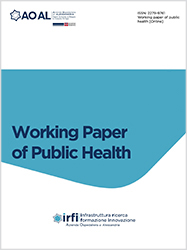Original Article(s)
Vol. 13 (2025)
Assessment of psychosocial and neuropsychological variables in patients with neurocognitive disorders and chronic stress in caregivers
Publisher's note
All claims expressed in this article are solely those of the authors and do not necessarily represent those of their affiliated organizations, or those of the publisher, the editors and the reviewers. Any product that may be evaluated in this article or claim that may be made by its manufacturer is not guaranteed or endorsed by the publisher.
All claims expressed in this article are solely those of the authors and do not necessarily represent those of their affiliated organizations, or those of the publisher, the editors and the reviewers. Any product that may be evaluated in this article or claim that may be made by its manufacturer is not guaranteed or endorsed by the publisher.
Received: 24 February 2025
Accepted: 8 May 2025
Accepted: 8 May 2025
2
Views
3
Downloads
Most read articles by the same author(s)
- Paola Toselli, Roberta Di Matteo, Cesare Bolla, Barbara Montanari, Marco Ricci, Elisabeth Marino, Serena Penpa, Tatiana Bolgeo, Antonio Maconi, Evaluation of the appropriateness of control measures related to nosocomial transmission of multidrug-resistant microorganisms within the SS Multipurpose Intensive Care Unit: observational study , Working Paper of Public Health: Vol. 12 (2024)
- Roberta Di Matteo, Claudia Gota, Claudia Bina, Lorenzo Martino, Rossana Perciante, Giovanna Condino, Simona Arcidiacono, Menada Gardalini, Antonella Cassinari, Tatiana Bolgeo, Antonio Maconi, Assessment of the adequacy of bowel preparation in patients undergoing colonoscopy: a retrospective study , Working Paper of Public Health: Vol. 12 (2024)
- Alida Cotroneo, Federico Modeo, Carmelo Bennici, Roberta Di Matteo, Marinella Bertolotti, Tatiana Bolgeo, Antonio Maconi, INFORTUNI SUL LAVORO: analisi dei dati dell’Azienda Ospedaliera SS Antonio e Biagio e C. Arrigo , Working Paper of Public Health: Quaderni 2022
- Carlo Alboreo, Roberta Di Matteo, Gianluigi Piazzolla, Lucia Di Nardo, Giuseppe Dipaola, Enkeleda Gjini, Emanuele Tatò, Alessandro Scelzi, Antonio Maconi, Tatiana Bolgeo, Federico Ruta, Implementation and impact of Fast-track in an Emergency Room: pre-post study , Working Paper of Public Health: Vol. 12 (2024)
- Roberta Di Matteo, Menada Gardalini, Denise Gatti, Tatiana Bolgeo, Antonio Maconi, An investigation on nurses’ competencies and practices regarding enteral tube medication administration: a cross-sectional study , Working Paper of Public Health: Vol. 12 (2024)
- Carlotta Bertolina, Marinella Bertolotti, Antonella Cassinari, Riccardo Mazzucco, Carolina Pelazza, Marta Betti, Antonio Maconi, Prognostic evaluation of KRAS and BRAF mutations in relation to mismatch repair protein status: preliminary survival analysis of patients with colorectal cancer , Working Paper of Public Health: Vol. 12 (2024)
- Giorgia Piceni, Gabriel Corbo, Carolina Pelazza, Serena Penpa, Marta Betti, Antonio Maconi, Data managers and clinical research coordinators: a tool to collect the hourly activity , Working Paper of Public Health: Vol. 12 (2024)
- Elisabetta Scomparin, Roberta Di Matteo, Valentina Bigucci, Valentina Repetto, Haymanot Bonelli, Erika Berta, Tatiana Bolgeo, Antonio Maconi, Contextual analysis of the first SARS-CoV-2 RNA screening period in nasopharyngeal swabs, 2020-2022: a comparison of two diagnostic tests , Working Paper of Public Health: Vol. 12 (2024)
- Daniele D'Alessio, Rossella Sterpone, Antonio Pepoli, Antonio Maconi, Intervention with strategic metacognitive training in a population of elders with subjective cognitive decline , Working Paper of Public Health: Vol. 12 (2024)
- Alessia Francese, Andrea Di Stasio, Armando Serao, Roberta Di Matteo, Mariasilvia Como, Mariateresa Dacquino, Tatiana Bolgeo, Antonio Maconi, A survey on prostate symptoms and quality of life in men with comorbidities at the Public Hospital SS. Antonio e Biagio e Cesare Arrigo of Alessandria , Working Paper of Public Health: Vol. 12 (2024)








